Sentence Structure Teaching Resources
Teach students the elements of sentence structure this school year with printable worksheets, sentence-building activities, sorting games and more primary school teaching resources designed to help extend your students' understanding of how to write clear and concise sentences that follow the rules of English grammar.
This extensive collection of teaching resources has been created by teachers for teachers like you. Aligned to the National curriculum, the English collection includes editable worksheets and teaching presentations and more to save primary teachers time on lesson planning.
Created by expert teachers, each resource in this sentence collection has been carefully reviewed and curated by our team. That means it's ready to use in the classroom! You'll even find editable resources, plus differentiated options.
New to teaching about sentence structure, or just looking for fresh ways to engage your students? Read on for a primer from our teaching team!
English Sentence Structure Explained
From subjects to predicates, objects to clauses, the English language is packed with rules specific to sentence structure that students need to learn on the way to becoming proficient writers.
Ready to break down how to build a sentence in English and look at some examples? Let's go!
Subject
The subject of a sentence is the noun or pronoun that performs the action or is described in the sentence.
For example, in the sentence 'Jaquan did his homework,' Jaquan is the subject.
Predicate
The predicate of a sentence expresses the action or state of being in a sentence.
Let's go back to the sentence 'Jaquan did his homework.' In this case, did is the predicate.
Object
The object of a sentence is a noun or pronoun that receives the action of the verb.
For example, 'homework' would be the object in 'Jaquan did his homework.'
Complement
The complement of a sentence is a word or phrase that completes the meaning of a sentence.
The complement can be a direct object, indirect object or subject complement.
For example: 'a doctor' in 'She became a doctor.'
Modifier
A modifier in a sentence provides additional information about a word or phrase in the sentence. It can be an adjective or an adverb. Example: 'kind' in 'She was a kind teacher.'
What Are Clauses?
Clauses are groups of words containing a subject and a verb. They're important to understand when learning sentence structure. After all, one kind of clause is a sentence!
There are two main types of clauses:
- Independent Clause — An independent clause can stand alone as a complete sentence because it expresses a complete thought. For example: 'I did all of my homework.'
- Dependent Clause — A dependent clause cannot stand alone as a sentence because it does not express a complete thought. It relies on an independent clause to make sense. Example: 'When I went to the store,' (Dependent clause) 'I bought an apple.' (Independent clause). Dependent clauses can be paired with independent clauses to build sentences.
- Plus Plan
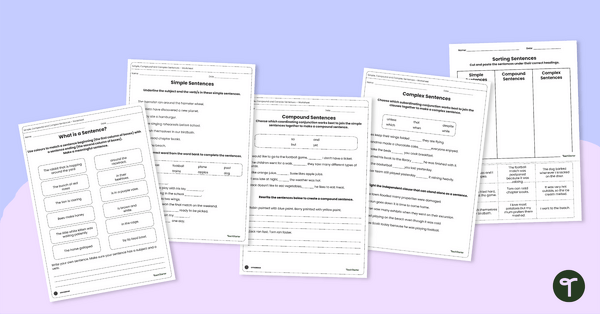
Simple, Compound and Complex Sentences Worksheets
Use this set of five grammar worksheets to teach about the structures of simple, compound and complex sentences.
- Plus Plan
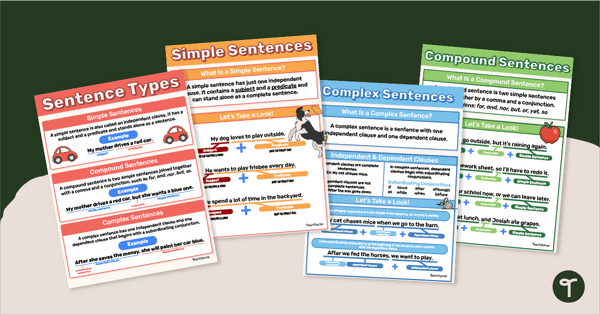
Simple, Compound and Complex Sentences Posters
Use these posters to show your students the attributes that make up simple, compound and complex sentences.
- Plus Plan
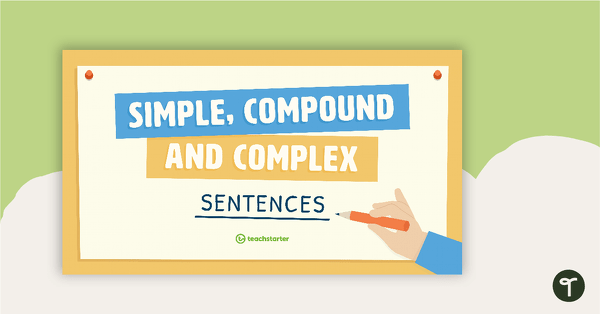
Simple, Compound and Complex Sentences PowerPoint
A 23 slide editable PowerPoint template which introduces the attributes of simple, compound and complex sentences.
- Plus Plan
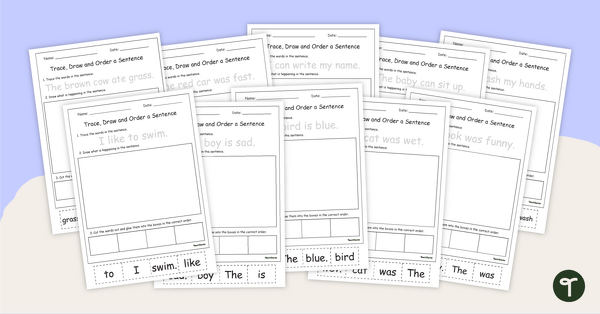
Trace, Draw and Order Sentences Worksheets
Use this set of sentence cut-and-paste worksheets to help your students build simple sentences.
- Free Plan
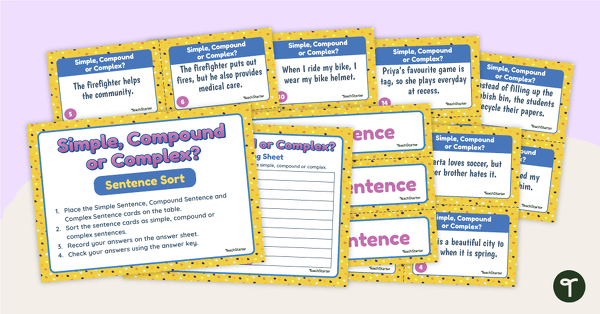
Simple, Compound and Complex Sentences Sort
Practise reading and identifying simple, compound and complex sentences with this sorting activity.
- Plus Plan
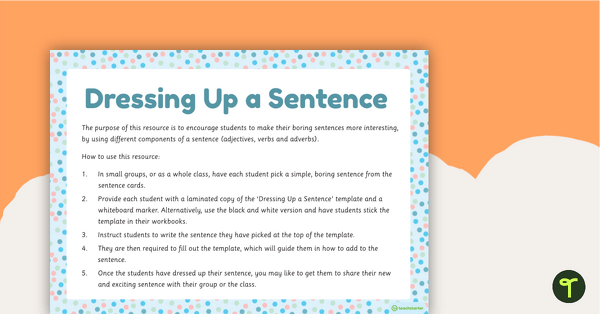
Dressing Up A Sentence Activity
An activity to help encourage students to add more descriptive language into their sentence writing.
- Free Plan
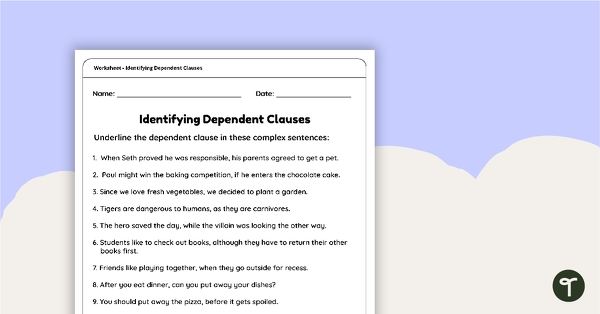
Identifying Dependent Clauses Worksheet
Practise identifying dependent clauses in complex sentences with a dependent clause worksheet.
- Plus Plan
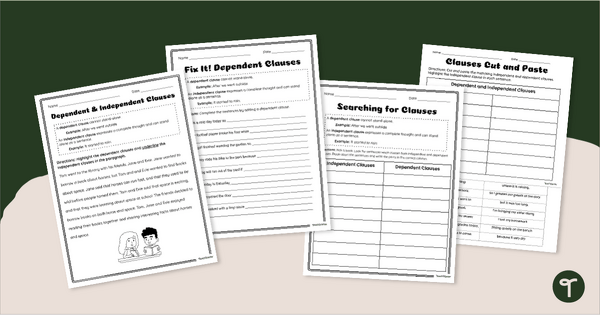
Independent and Dependent Clauses Worksheet Pack
Introduce the concept of independent and dependent clauses with a set of printable sentence structure worksheets.
- Plus Plan
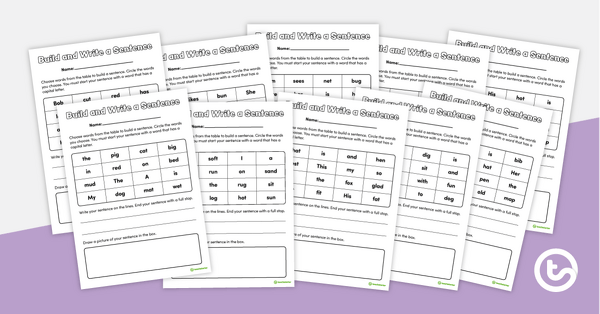
Build and Write a Sentence – Worksheets
A set of 10 worksheets to enable students to practise building and writing sentences.
- Plus Plan
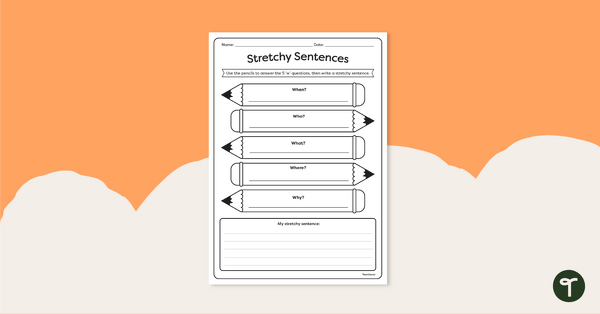
Stretchy Sentences Worksheet
Use this worksheet to help your students write detailed and descriptive sentences.
- Plus Plan
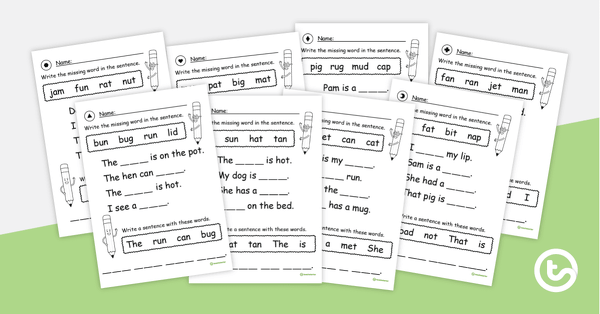
Complete the Sentences – Worksheets for Beginning Writers
A set of 10 worksheets for students to practise completing simple sentences.
- Plus Plan
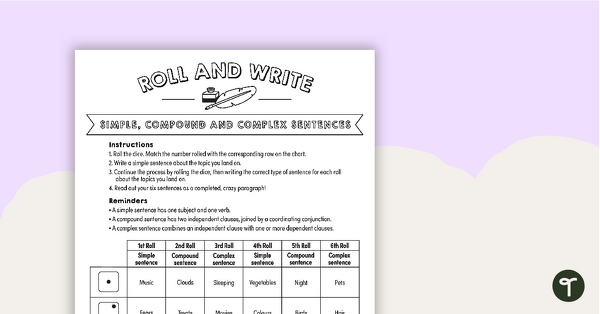
Roll and Write – Simple, Compound and Complex Sentences
An interactive activity to help students practise writing simple, compound and complex sentences.
- Plus Plan
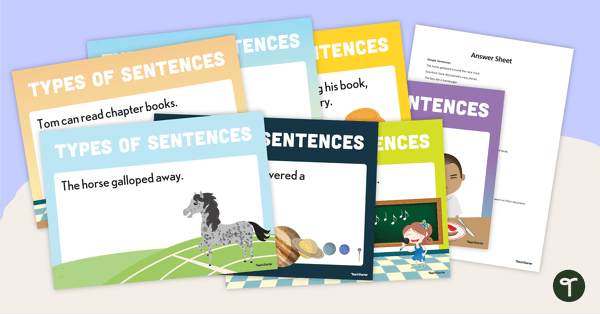
Simple, Compound and Complex Sentences Flashcards
Use this set of 16 colourful flashcards to introduce students to the attributes that make up simple, compound and complex sentences.
- Plus Plan
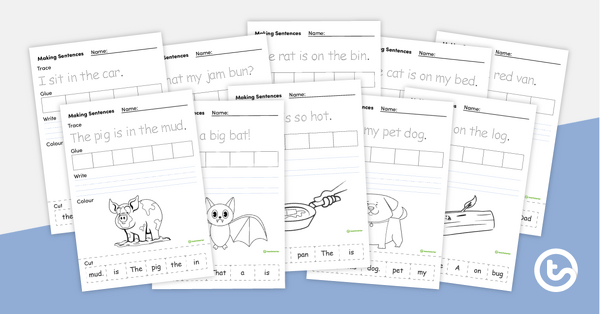
Making Sentences – Cut and Paste Worksheets
A set of 10 cut and paste worksheets for making short sentences.
- Plus Plan
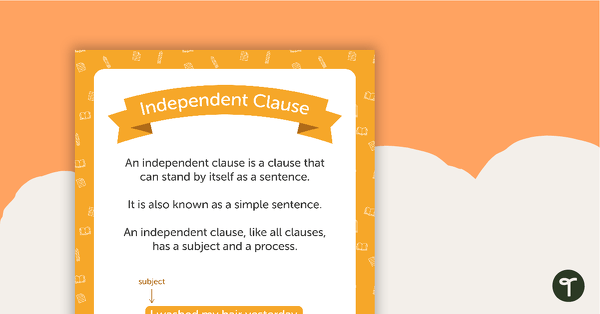
Types of Clauses Posters
A set of five posters examining the structure of independent and dependent clauses.
- Plus Plan
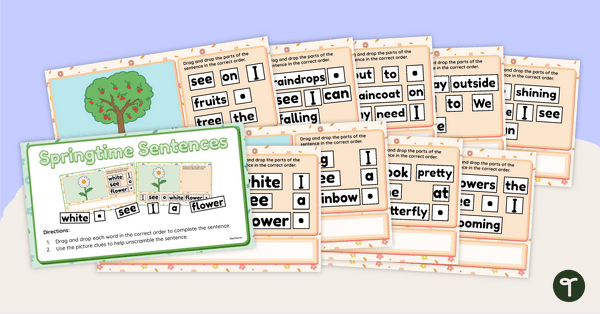
Springtime Sentence Building - Interactive Activity
Build a strong sentence-writing foundation with this interactive spring-themed sentence building activity.
- Plus Plan
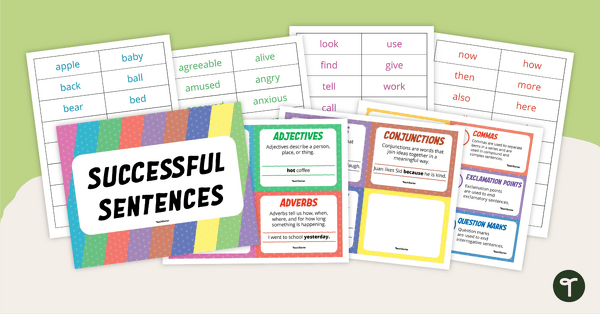
Successful Sentences – Sentence Construction Cards
Word cards for constructing complex sentences.
- Plus Plan
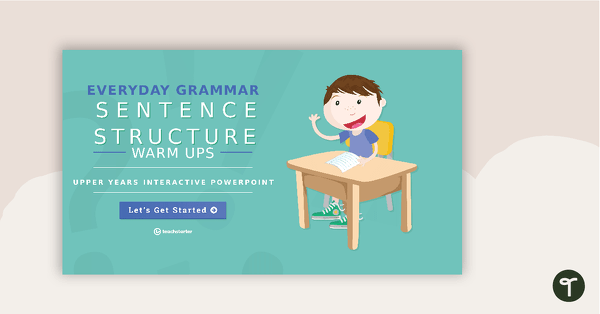
Everyday Grammar Sentence Structure Warm Ups - Upper Years Interactive PowerPoint
An engaging 44 slide interactive PowerPoint to use in the upper years classroom when learning about grammar and sentence structure.
- Plus Plan
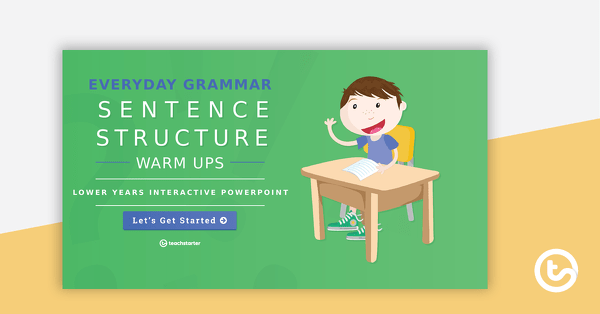
Everyday Grammar Sentence Structure Warm Ups - Lower Years Interactive PowerPoint
An engaging 44 slide interactive PowerPoint to use in the lower years classroom when learning about grammar and sentence structure.
- Plus Plan
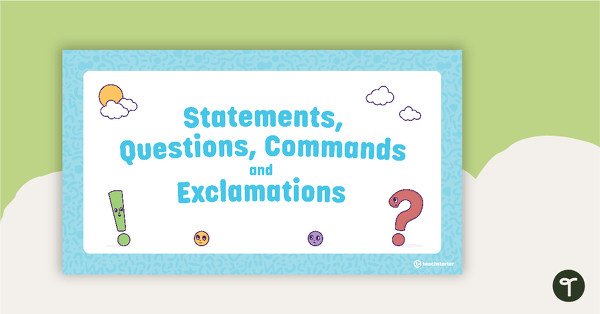
Statement, Question, Command, Exclamation PowerPoint
A 14-slide editable PowerPoint template that introduces the attributes of statements, questions, commands and exclamations.
- Plus Plan
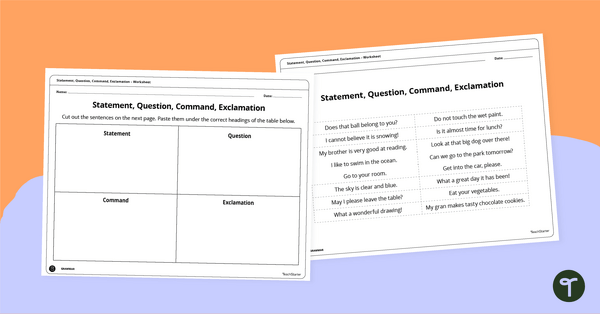
Statement, Question, Command, Exclamation – Cut and Paste Worksheet
Identify statement, command, question, and exclamation sentences with a Types of Sentences Cut and Paste worksheet for Year 2.
- Free Plan
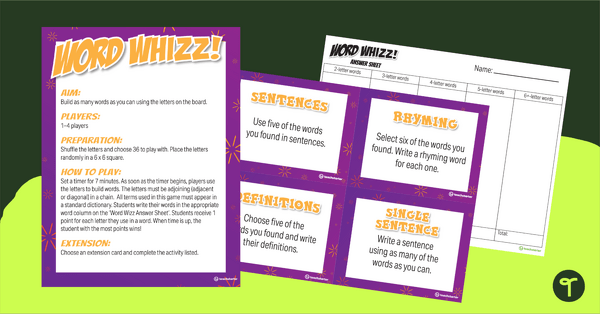
Word Whizz - Spelling Game
Letters are jumbled everywhere. It’s your challenge to combine them into words!
- Plus Plan
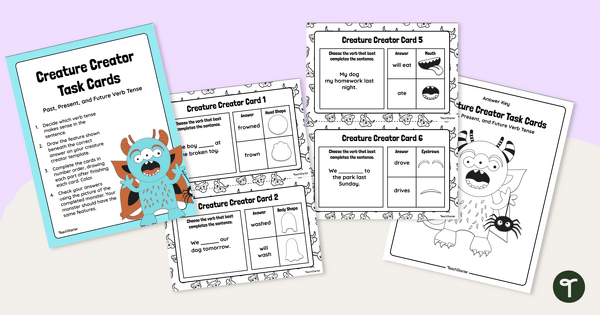
Creature Creator - Verb Tense Task Cards
Create a mystery creature using past, present and future tense verbs.
- Plus Plan
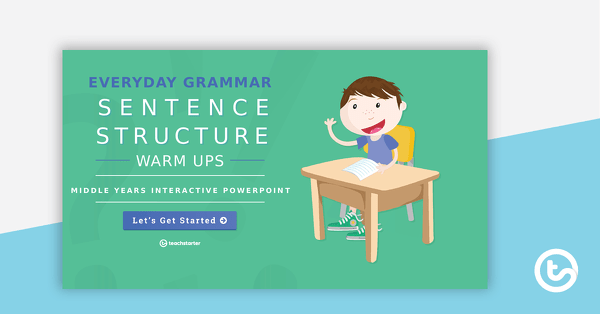
Everyday Grammar Sentence Structure Warm Ups - Middle Years Interactive PowerPoint
An engaging 44 slide interactive PowerPoint to use in the middle years classroom when learning about grammar and sentence structure.
- Free Plan
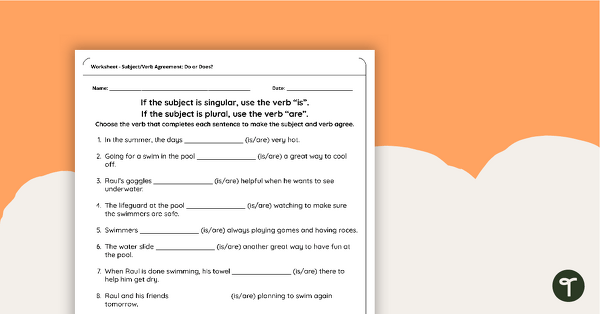
Is/Are Subject Verb Agreement Worksheet
Provide students with subject-verb agreement practice with this worksheet focusing on using ‘is’ and ‘are’ correctly.
- Plus Plan
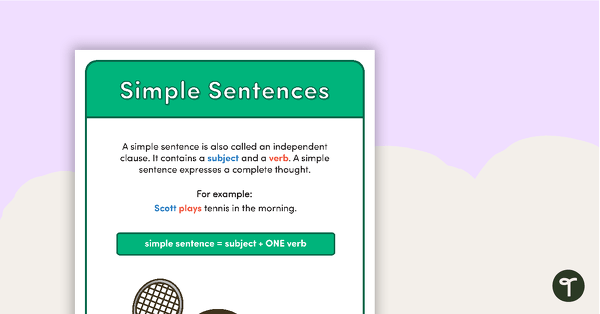
Types of Sentences Posters
A set of 7 posters outlining the structure of various types of sentences.
- Plus Plan
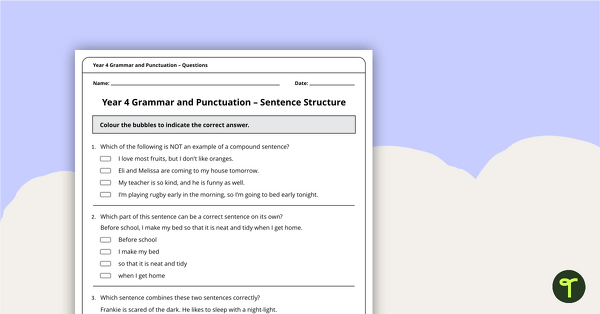
Grammar and Punctuation Assessment Tool – Year 4
A set of 5 grammar and punctuation assessment tools suited to Year 4 students.
- Plus Plan
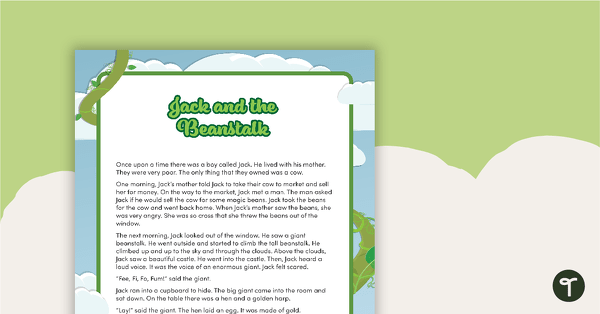
Capital Letter and Full Stop Scavenger Hunt Worksheet
A reading passage and 2 engaging worksheets that explore the importance of capital letters and full stops.
- Plus Plan
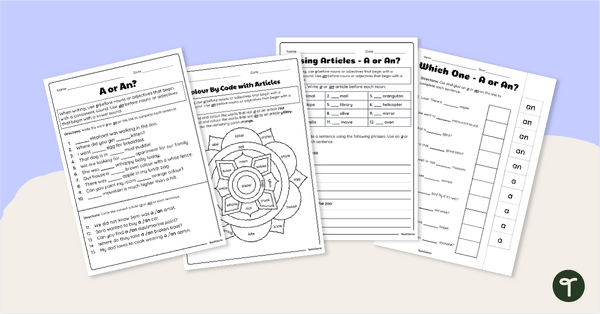
A or An? - Worksheets
Teach when to use A or An as an article with a printable pack of 'A or An' Worksheets.
- Plus Plan
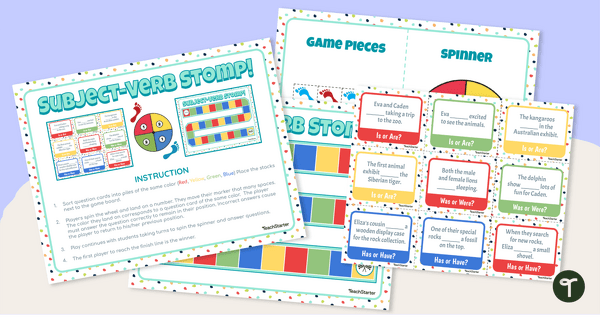
Subject–Verb Stomp! Verb Agreement Board Game
Play a game of Subject-Verb Stomp! to engage your learners and build better sentence-writing skills.
- Free Plan
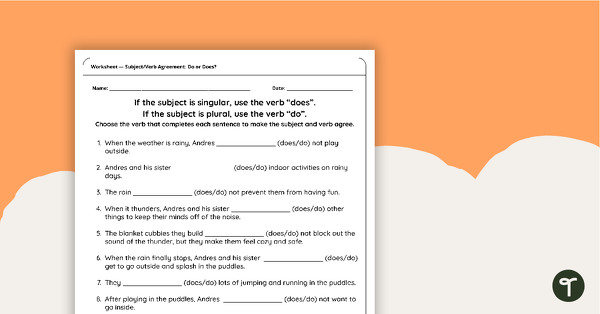
Do/Does Subject Verb Agreement Worksheet
Provide students with subject-verb agreement practice with this worksheet focusing on using ‘do’ and ‘does’ correctly.
- Free Plan
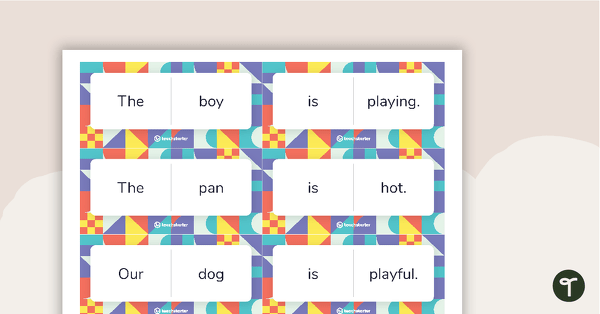
Simple Sentence Dominoes (Version 1)
A set of 30 dominoes to assist younger students with building simple sentences.